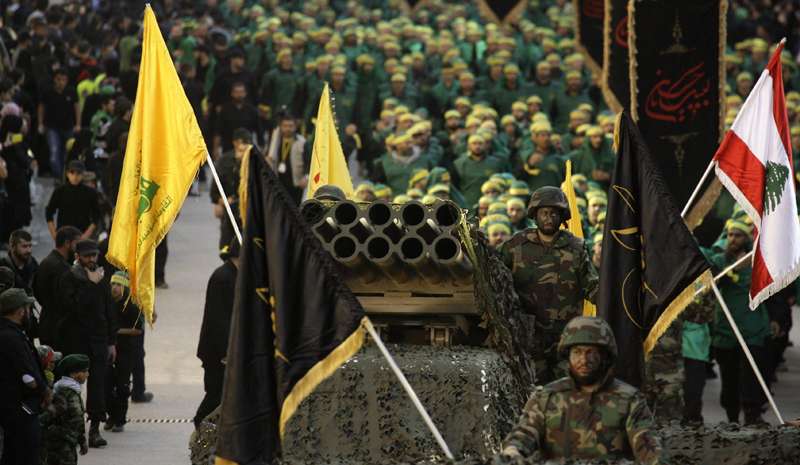Lebanese president says no armed groups are permitted in country

“Hezbollah parade in November 2014 in Nabatieth, Lebanon”. Photo by Mahmoud Zayyat/AFP/Getty Images
Lebanon’s president told a senior Iranian official that following a US-backed deal, no group in the country is allowed to carry arms or depend on foreign support, while Iran’s continues to support Hezbollah, according to Asharq Al-Awsat via Reuters on August 13th.
This occurred after Lebanon’s cabinet approved the goals of a US-backed plan to disarm the Iran-allied Hezbollah on August 7th.
President Joseph Aoun met with the secretary of Iran’s Supreme National Security Council, Ali Larijani, in Beirut on August 13th, warning against foreign involvement in his country’s internal affairs. He said Lebanon was willing to collaborate with Iran but only within the limits of national sovereignty and reciprocal respect, reiterating that Lebanon and its military bear exclusive responsibility for the protection of its citizens.
Larijani said that the Islamic Republic of Iran acknowledges Lebanon’s sovereignty and does not get involved in its decision-making.
“Any decision taken by the Lebanese government in consultation with the resistance is respected by us,” he said, following separate talks with the country’s Parliament Speaker Nabih Berri, whose Amal Movement is allied with Hezbollah.
By “resistance”, Larijani was referring to Hezbollah, which was set up in 1982. The group has evolved into a “state-within-a-state” group. The group is better-equipped than Lebanon’s army and has been in conflict with Israel over tens of years. Iran has historically supported Hezbollah, given their shared ideology and interests, particularly to counter Israel and US influence.
“Iran didn’t bring any plan to Lebanon, the US did. Those intervening in Lebanese affairs are those dictating plans and deadlines”, he added.
Larjiani went on to say that Lebanon should not “mix its enemies with its friends – your enemy is Israel, your friend is the resistance … I recommend to Lebanon to always appreciate the value of resistance.”
Lebanon’s Prime Minister Nawaf Salam criticised recent statements on Lebanon by Iranian officials, including Foreign Minister Abbas Araghchi, after speaking with Larijani. Nawaf slammed these remarks as a “violation” of the concept of mutual state sovereignty.
The top advisor to Iran’s supreme leader also denounced the Lebanese government’s gesture towards disarmament. He said: “If Hezbollah lays down its weapons, who will defend the lives, property, and honour of the Lebanese?”
The US had sent out a roadmap in June which presented clear steps to disarm Hezbollah. President Aoun has been receptive to this proposal while still trying to preserve Hezbollah’s political role. The Maronite Christian president even hinted that Israel has the right to attack if this disarmament is not achieved.
There has been public outrage from anti-government protests as well as from Hezbollah as a result of these negotiations. Groups have denounced the deal, claiming it serves Israeli interests and further strains Lebanon’s already overburdened political structure and institutions, amid ongoing Israeli attacks.
Aoun’s government has still cautioned that a poorly handled disarmament process could destabilise the fragile political and security landscape. He urged for the creation of a permanent peacekeeping mechanism and adherence to UN Security Council Resolution 1701. The Lebanese government also submitted counter-proposals, and has demanded that the US pressures Israel to withdraw and cease any further counterproductive attacks. Lebanon has also called for the renewal of UNIFIL’s peacekeeping mandate, and additional financial support for Lebanon’s army.
Hezbollah has rejected repeated calls to disarm since a ceasefire with Israel on November 27th, despite being seriously impaired in the war, with Israel killing its leaders in airstrikes and bombings. Israel, meanwhile, has continued to violate the ceasefire.
The recent conflict began in October 2023 when Hezbollah opened fire at Israeli positions along Lebanon’s southern border as an act of support for its ally, Hamas, at the start of Israel’s war in Gaza.
Asharq Al-Awsat via Reuters, Maghrebi.org
Want to chase the pulse of North Africa?
Subscribe to receive our FREE weekly PDF magazine














